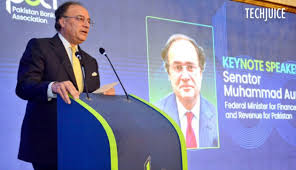Finance Minister says government committed to build a resilient economy
Federal Finance Minister Senator
Muhammad Aurangzeb emphasized the government's commitment to structural reforms
and export-led growth during the opening session of the Pakistan Banking Summit
2025. Organized by the Pakistan Banks Association (PBA), the two-day event aims
to foster collaboration among banking industry leaders and integrate Pakistan’s
financial sector with global markets.
Addressing the summit, Senator
Aurangzeb highlighted the government's tough policy decisions, which have led
to significant improvements in key macroeconomic indicators, including the current
account balance, inflation rates, and stock market performance.
"Our goal is to build a
resilient economy through fundamental reforms," he stated, citing key
areas of focus such as:
- Overhauling the Federal Board of Revenue (FBR)
- Enhancing fiscal discipline
- Restructuring and rightsizing public sector entities
- Improving governance structures
- Reforming the energy sector
Read More Pakistan
looks to borrow $4 billion loans from Middle Eastern banks to meet external
financing
The minister emphasized that tax
policy should extend beyond mere numbers to consider economic impact, noting
that the Ministry of Finance is actively engaged in shaping progressive tax
reforms.
"We must transform the DNA of
our economy for sustainable and inclusive growth," Aurangzeb asserted,
reaffirming the government’s dedication to pushing forward with reforms despite
challenges.
He praised provincial governments
for their legislative strides on agriculture income tax, calling it a landmark
achievement in structural reform. The government is also working on relaunching
PIA’s privatization and cutting federal expenditures, with a cabinet committee
reviewing rightsizing measures in a phased approach.
The finance minister highlighted two
pressing challenges for Pakistan:
- Population growth
- Climate change
In response, Pakistan is developing
a 10-year partnership with the World Bank to address these issues, alongside
fiscal discipline. Aurangzeb also mentioned that the government has initiated
early consultations for the upcoming budget to ensure stakeholder feedback is
incorporated.
He urged the business community to
play a proactive role in achieving export-led growth, stressing that
contributions should not be limited to the textile sector alone. The government,
he assured, is committed to supporting competitive, export-oriented investments.
Read More Banking
sector in Pakistan to bolster growth of digital economy
Role of Banking Sector in Economic
Growth
Aurangzeb underlined the importance of the banking sector in fostering economic
growth and encouraging financial documentation. He called on banks to
prioritize financing for SMEs, agriculture, livestock, dairy, and other
high-impact sectors.
He lauded the PBA for hosting the
summit, recognizing it as a valuable platform for addressing challenges and
exploring solutions.
IMF Engagement and Future Plans
Responding to a media question, the finance minister revealed that an International
Monetary Fund (IMF) team is visiting Pakistan to review climate finance
measures, with another team scheduled for a mid-year economic review in early
March.
PBA Chairman’s Address
Zafar Masud, Chairman of the PBA and CEO of the Bank of Punjab, opened the
summit by highlighting the banking sector's critical role in tax collection and
its emergence as one of the country's largest taxpayers.
Read More World
Bank report highlights tax reforms in Pakistan
Masud also discussed strides in
promoting a cashless economy and financial inclusion, as well as the PBA’s
involvement in PIA’s restructuring plan and FBR data collection initiatives. He
urged for the formalization of the agriculture and SME sectors to broaden access
to banking and financial services.
Source: Techjuice
